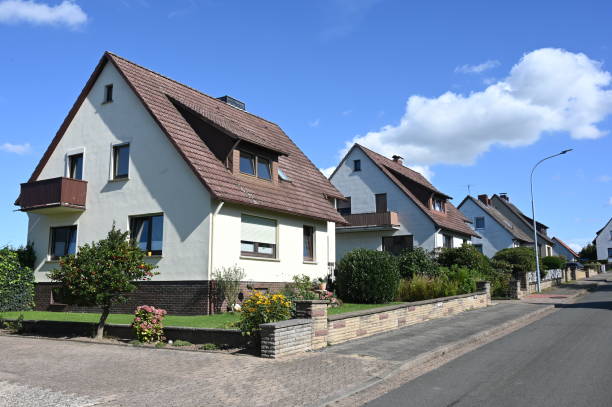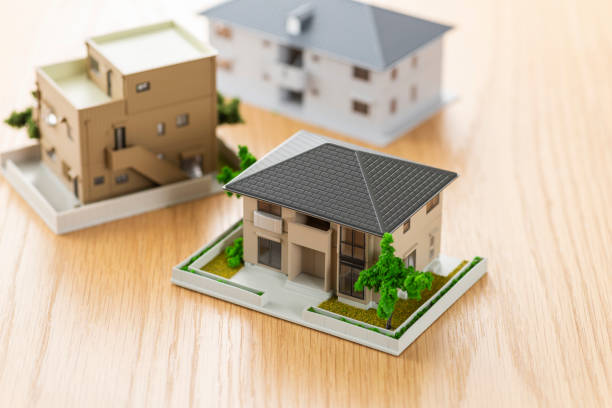Townhouse vs. Single-Family House: Which One Is Right for You?

When buying a home, one of the biggest decisions you’ll face is choosing between a townhouse and a single-family house. Both options offer unique benefits and challenges, and the right choice depends on your lifestyle, budget, and long-term goals. In this guide, we’ll compare a townhouse vs. single-family house to help you determine which one suits you best.
Townhouse vs. Single-Family House: Key Differences
Before diving into the pros and cons, let’s break down the primary differences between a townhouse and a single-family house:
Ownership Structure: A townhouse is typically attached to one or more neighboring units, whereas a single-family house is a detached home with no shared walls.
Space and Layout: Single-family houses usually have more interior and exterior space, including a private yard. Townhouses, while more compact, often feature multiple floors to maximize space.
Community and Privacy: Townhouses are part of a shared community, which can offer a sense of belonging but also means less privacy. Single-family homes provide more solitude and personal space.
HOA Rules and Fees: Many townhouses belong to homeowners’ associations (HOAs) that enforce community rules and charge fees for maintenance and amenities, whereas single-family houses may have fewer restrictions and no mandatory fees.
Resale Value: Single-family houses often appreciate more in value compared to townhouses, making them a stronger long-term investment in many markets.

Cost Comparison: Which One Fits Your Budget?
When evaluating single-family house vs. townhouse cost, consider these factors:
Purchase Price: Townhouses tend to be more affordable than single-family homes, making them a popular choice for first-time buyers and those looking for a lower-cost entry into homeownership.
Property Taxes: Since townhouses typically have a smaller footprint, property taxes are often lower compared to single-family houses. However, the location plays a significant role in determining tax rates.
Utility and Maintenance Costs: A single-family home usually has higher utility bills due to its larger size and increased maintenance responsibilities. In contrast, townhouses, with shared walls and smaller square footage, may be more energy-efficient and cost-effective.
HOA Fees: Townhouses often come with monthly or annual HOA fees that cover exterior maintenance, landscaping, and amenities like pools or gyms. Single-family homeowners handle all maintenance themselves but avoid these recurring costs.
Insurance Costs: Homeowners insurance for a single-family home is typically more expensive than for a townhouse due to the larger property size and higher liability. Townhouse owners may have some coverage included in HOA fees, reducing their out-of-pocket costs.

Maintenance and Responsibilities: What to Expect
Maintenance is a major factor in homeownership, and the responsibilities differ between townhouses and single-family houses.
Townhouse Owners: Benefit from shared maintenance responsibilities, with HOAs covering common areas, roofing, and exterior repairs. This setup can be convenient for busy homeowners who prefer a hands-off approach to property upkeep. However, homeowners must comply with community rules regarding exterior modifications, landscaping, and property use.
Single-Family Homeowners: Have full control over their property but are solely responsible for all repairs, landscaping, and upkeep. This means handling tasks like mowing the lawn, repairing the roof, and maintaining the driveway, which can be time-consuming and costly. However, the benefit is complete autonomy over home improvements and modifications.
Pros and Cons of a Townhouse
Pros:
More affordable purchase price
Lower property taxes
Less maintenance responsibility due to HOA
Often located in walkable communities with amenities
Energy-efficient due to shared walls reducing heating and cooling costs
Sense of community with close neighbors
Potential for shared security services, enhancing safety
Cons:
Less privacy due to shared walls
HOA fees and rules can be restrictive
Limited outdoor space, which may be a downside for those who enjoy gardening or have pets
Potential for noise from neighbors
Resale value may appreciate at a slower rate than single-family homes
Limited customization options for exterior and landscaping

Pros and Cons of a Single-Family House
Pros:
More privacy and space, both indoors and outdoors
No shared walls or HOA restrictions (in most cases)
Full control over property design, renovations, and modifications
Better resale value in many markets due to higher demand
More flexibility for families who need additional rooms, storage, or backyard space
Greater independence from community regulations
Ability to expand or build additions
Cons:
Higher purchase price and property taxes
More maintenance and repair responsibilities, which can require time and money
Higher utility and landscaping costs
Less access to shared amenities like pools or fitness centers unless in a planned community
Increased security concerns compared to townhouse communities with shared security services
Townhouse vs. Single-Family House: Which One Is Right for You?
The decision between a townhouse vs. single-family house depends on your priorities:
If you prefer affordability, convenience, and low-maintenance living, a townhouse might be ideal.
If privacy, space, and long-term investment potential are more important, a single-family home may be the better choice.
If you enjoy a strong sense of community and shared amenities, a townhouse can provide those benefits.
If you want full control over your property and the freedom to make changes, a single-family home is the way to go.
Consider your lifestyle, financial situation, and future goals when making this decision.

Conclusion
Choosing between a townhouse and a single-family house is a major step in your home-buying journey. Whether you’re a first-time buyer looking for affordability or an investor seeking long-term value, it’s essential to weigh the pros and cons carefully. Your decision will impact not only your finances but also your lifestyle and daily living experience.
If you’re navigating the real estate market, Dwanderful is here to help. Dwan, a seasoned real estate investor and podcast host, offers valuable insights and resources to help you make informed decisions. She provides a free book, Real Estate Lingo, to help you understand industry terms, and a paid book, Five Pillars of Real Estate Investing, to guide you through successful investing.
Curious about your earning potential in real estate? Take the Dwanderful quiz—in less than a minute, you can discover how you could generate six figures in the next six months, whether you’re buying your first property or your next! Contact us now!
Frequently Asked Questions:
Which type of home is better for first-time buyers?
A townhouse is often a better option for first-time buyers due to its lower cost, reduced maintenance responsibilities, and access to shared amenities. However, a single-family house may be preferable for those seeking more privacy and space, especially if they plan to expand their family in the future.
How does location impact the choice between a townhouse and a single-family house?
Urban and suburban areas often have more townhouses, providing easy access to work, shopping, and entertainment. Single-family homes are more common in suburban and rural areas, offering larger lots and more privacy. Additionally, property values and future appreciation potential can vary significantly depending on the neighborhood and surrounding developments.
What are the HOA (Homeowners Association) rules and fees for townhouses?
HOA rules vary by community but typically cover exterior maintenance, landscaping, and shared amenities. Fees can range from $50 to several hundred dollars per month, depending on the location and services provided. While HOA fees ensure well-maintained surroundings, they can also come with restrictions on things like exterior paint colors, landscaping choices, and even pet ownership. Always review HOA regulations before purchasing to ensure they align with your lifestyle preferences.
By understanding these key differences, you can make an informed choice between a townhouse and a single-family house that aligns with your lifestyle and financial goals.


